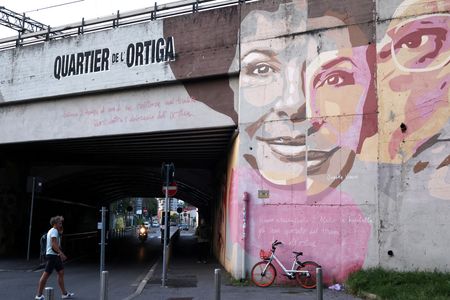By Gianluca Semeraro
MILAN (Reuters) -Four steps separated Ornella Vanoni from the life she craved: the four steps leading up to the stage of Milan’s Piccolo Teatro.
“I twisted my nerves, I pulled my hair,” she recalled in her memoir, “Vincente o perdente” (“Winner or Loser”), of the fear that gripped her in the mid-1950s. “I wanted to be there, up front, but those few metres separating me from the stage were terrible.”
Finally, the theatre’s director declared that it would take a miracle for her to perform in public. In defiance, she did.
“There are birth dates that are not recorded in paperwork but which are, instead, the days when you finally become who you really are,” she wrote of that inaugural act of daring.
Vanoni would go on to become a leading voice in Italian music and one of the country’s most beloved entertainers. Having first gained prominence with televised song festivals in the early 1960s, her career spanned more than seven decades and inspired several generations of performers.
An absorbing storyteller whose songs explored crime, poverty and social exclusion, as well as love, loss and womanhood, she sold more than 55 million records and released some 40 studio albums, according to Italian media.
As fashions and customs changed in Italy, Vanoni’s intimate, enchanting voice remained a symbol of emotional authenticity in Italian music.
Elegant and fiercely independent, she retained a public profile through appearances on talk shows long after her most popular album releases.
She died late on Friday aged 91 at her home in Milan of cardiac arrest, the Corriere della Sera newspaper and the AGI news agency said.
Of her funeral plans, she had told television show Che Tempo Che Fa: “The coffin should be cheap because I want to be cremated. Then throw me in the sea, maybe in Venice.”
“I have the dress,” she added. “It’s by Dior.”
FROM THEATRE TO POP
The red-headed Vanoni was born in 1934 into a well-to-do Milanese family. Her father was an entrepreneur in the pharmaceutical sector.
That allowed her family to send her to a school run by nuns in Italy then to colleges in Switzerland, Britain and France, where she learned German, English and French.
She said that her mother used to tell her that a good girl should always leave the house smartly turned out, wearing “some heels and a bit of makeup”.
Vanoni first worked as an actor under the mentorship of director Giorgio Strehler at the Piccolo Teatro, before transitioning to music.
Her hits include “Senza fine” (Endless), first released in 1961, and “Domani è un altro giorno” (Tomorrow is Another Day) from 1971.
Her biggest commercial success was “L’appuntamento” (“The Date”) – the Italian version of the Brazilian song “Sentado à beira do caminho” by Erasmo and Roberto Carlos. Originally released in 1970, it enjoyed a second lease of life when it featured in the soundtrack of Steven Soderbergh’s 2004 film “Ocean’s Twelve”, expanding her fandom well beyond Italy’s borders.
Vanoni explored different musical genres. Her early folk songs about Milan’s criminal underworld earned her the nickname “Cantante della mala” (underworld singer). She later became an interpreter of works by leading Italian songwriters, and collaborated with Brazilian artists Toquinho and Vinicius de Moraes, as well as jazz musicians.
A close friend of fashion designer Gianni Versace, who was killed in 1997, she also inspired leading stylists Giorgio Armani and Valentino to create clothes for her.
HUSBAND AND LOVERS
Vanoni described theatre director Strehler, 13 years her senior, as the first love of her life. She also had a relationship with Gino Paoli, an Italian singer-songwriter with whom she collaborated.
She was married to Lucio Ardenzi between 1960 and 1972. The couple had a son, Cristiano.
In an interview for the showbusiness section of Gazzetta dello Sport in 2024, Vanoni said that she never loved her husband but had thought “sooner or later, you have to get married”.
Of the time they met, she said: “I didn’t know what to do with myself. I had broken up with Strehler, who was married; I loved Paoli, who was married; I met Ardenzi, I got married.”
In her later years, Vanoni remained a prominent figure in the arts, collaborating with younger Italian artists. In interviews she spoke candidly about aging, solitude and creativity and shared her thoughts about politics and the news while showing a lively sense of humour.
Vanoni, who suffered greatly from self-doubt in her youth, had by old age come to embrace the many facets of her personality. “I am one of those women. Women on fire, fragile and full of tenderness, sheltered behind nervous outbursts, elegant detachment, and sarcasm,” she wrote in her memoir.
“Desperate and happy, alone and celebrated, furious and delicate.”
(Editing by Keith Weir and Olivier Holmey)










